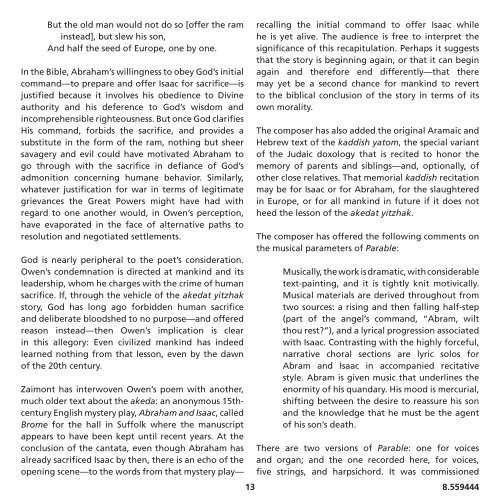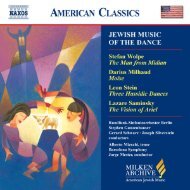Download Liner Notes PDF - Milken Archive of Jewish Music
Download Liner Notes PDF - Milken Archive of Jewish Music
Download Liner Notes PDF - Milken Archive of Jewish Music
You also want an ePaper? Increase the reach of your titles
YUMPU automatically turns print PDFs into web optimized ePapers that Google loves.
But the old man would not do so [<strong>of</strong>fer the raminstead], but slew his son,And half the seed <strong>of</strong> Europe, one by one.In the Bible, Abraham’s willingness to obey God’s initialcommand—to prepare and <strong>of</strong>fer Isaac for sacrifice—isjustified because it involves his obedience to Divineauthority and his deference to God’s wisdom andincomprehensible righteousness. But once God clarifiesHis command, forbids the sacrifice, and provides asubstitute in the form <strong>of</strong> the ram, nothing but sheersavagery and evil could have motivated Abraham togo through with the sacrifice in defiance <strong>of</strong> God’sadmonition concerning humane behavior. Similarly,whatever justification for war in terms <strong>of</strong> legitimategrievances the Great Powers might have had withregard to one another would, in Owen’s perception,have evaporated in the face <strong>of</strong> alternative paths toresolution and negotiated settlements.God is nearly peripheral to the poet’s consideration.Owen’s condemnation is directed at mankind and itsleadership, whom he charges with the crime <strong>of</strong> humansacrifice. If, through the vehicle <strong>of</strong> the akedat yitzhakstory, God has long ago forbidden human sacrificeand deliberate bloodshed to no purpose—and <strong>of</strong>feredreason instead—then Owen’s implication is clearin this allegory: Even civilized mankind has indeedlearned nothing from that lesson, even by the dawn<strong>of</strong> the 20th century.Zaimont has interwoven Owen’s poem with another,much older text about the akeda: an anonymous 15thcenturyEnglish mystery play, Abraham and Isaac, calledBrome for the hall in Suffolk where the manuscriptappears to have been kept until recent years. At theconclusion <strong>of</strong> the cantata, even though Abraham hasalready sacrificed Isaac by then, there is an echo <strong>of</strong> theopening scene—to the words from that mystery play—recalling the initial command to <strong>of</strong>fer Isaac whilehe is yet alive. The audience is free to interpret thesignificance <strong>of</strong> this recapitulation. Perhaps it suggeststhat the story is beginning again, or that it can beginagain and therefore end differently—that theremay yet be a second chance for mankind to revertto the biblical conclusion <strong>of</strong> the story in terms <strong>of</strong> itsown morality.The composer has also added the original Aramaic andHebrew text <strong>of</strong> the kaddish yatom, the special variant<strong>of</strong> the Judaic doxology that is recited to honor thememory <strong>of</strong> parents and siblings—and, optionally, <strong>of</strong>other close relatives. That memorial kaddish recitationmay be for Isaac or for Abraham, for the slaughteredin Europe, or for all mankind in future if it does notheed the lesson <strong>of</strong> the akedat yitzhak.The composer has <strong>of</strong>fered the following comments onthe musical parameters <strong>of</strong> Parable:<strong>Music</strong>ally, the work is dramatic, with considerabletext-painting, and it is tightly knit motivically.<strong>Music</strong>al materials are derived throughout fromtwo sources: a rising and then falling half-step(part <strong>of</strong> the angel’s command, “Abram, wiltthou rest?”), and a lyrical progression associatedwith Isaac. Contrasting with the highly forceful,narrative choral sections are lyric solos forAbram and Isaac in accompanied recitativestyle. Abram is given music that underlines theenormity <strong>of</strong> his quandary. His mood is mercurial,shifting between the desire to reassure his sonand the knowledge that he must be the agent<strong>of</strong> his son’s death.There are two versions <strong>of</strong> Parable: one for voicesand organ; and the one recorded here, for voices,five strings, and harpsichord. It was commissioned13 8.559444
















